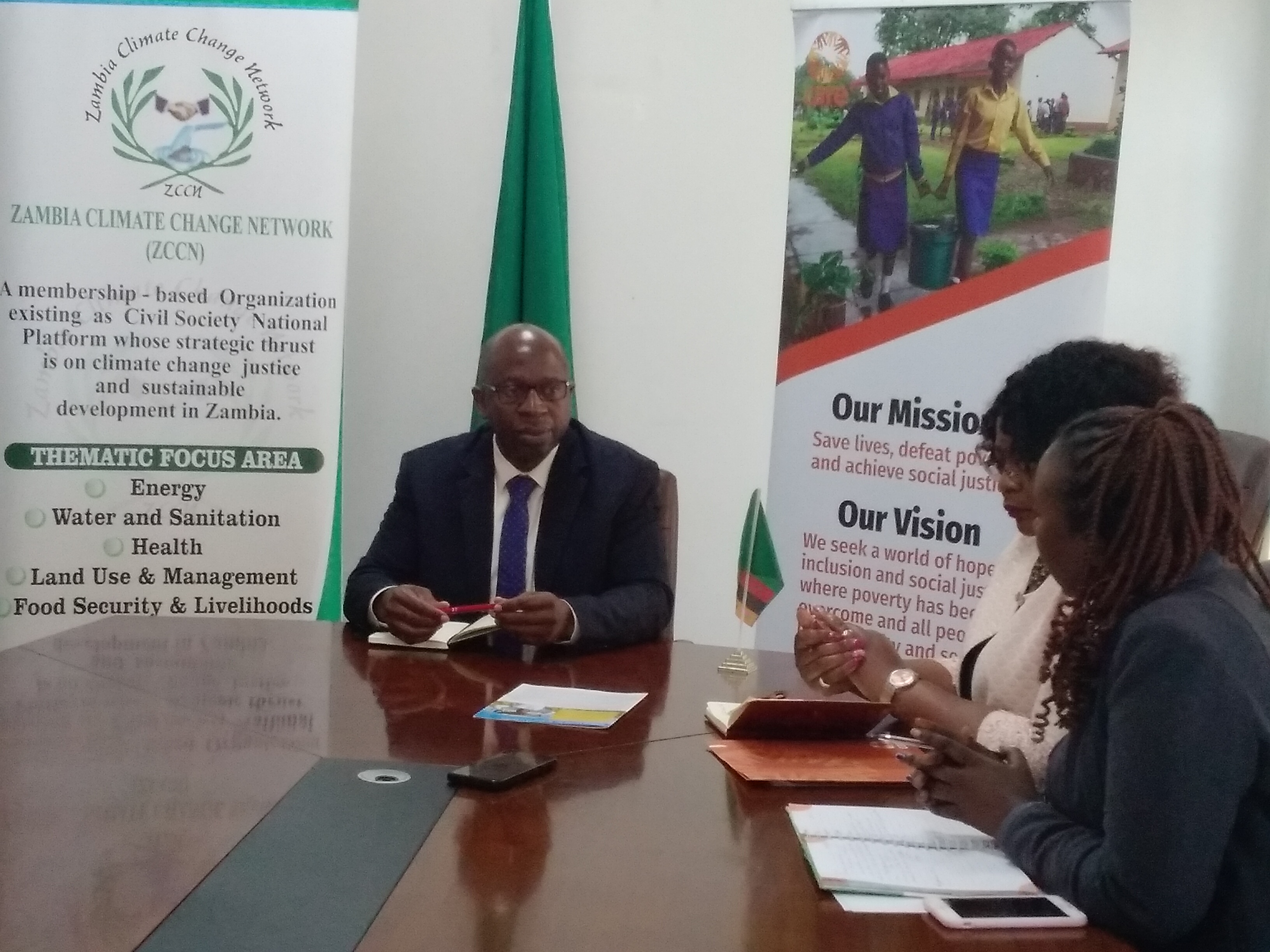CLIMATE CONSORTIUM PROPOSES LOCAL ADAPTATION OPTIONS
Notice: Undefined index: catFilterList in /home/zambi/public_html/wp-content/plugins/wp-likes/api.php on line 243

Ministry of Green Economy and Environment Permanent Secretary Douty Chibamba listening to Climate Campaigners – Care International Zambia Country Director Chikwe Mbweeda and Zambia Climate Change Network (ZCCN) Acting National Coordinator Lydia Chibambo. – PICTURE by National Agricultural Information Service (NAIS).
By HAPPY MULOLANI
AS climate change continues to ravage communities globally, there is need to develop locally-Led Adaptation solutions. In Zambia, climate change campaigners are frantically engaged in addressing climatic shocks through building adaptation measures by enhancing ecosystems, infrastructure, livelihoods, and health systems.
Care Zambia International is one of the members of the Zambia Climate Change Network (ZCCN) in the forefronting of supporting communities in coming up with nature based solutions as a way of encouraging alternative livelihoods.
This led to developing a communique on locally-Led Adaptation learning event convened by Care Zambia in Lusaka recently. More than 60 participants echoed their voices and perspectives aimed at raising awareness and strengthening local capacities, inform policy and identify scalable initiatives on locally-led Adaptation strategies.
According to the communique, it focuses on “the status of local climate change adaptation initiatives in Zambia with emphasis on the potential for novel, scalable, sustainable, and gender-transformative innovations that inform climate change policy and practice.”
Zambia Climate Change Network Acting National Coordinator Lydia Chibambo says the communique arises from a learning workshop which developed outcomes focused on locally-Led Adaptation measures aimed at tackling climate change.
Ms. Chibambo said, “local communities themselves have indigenous knowledge that should not be ignored as it births preservation of the communities.”
Ms. Chibambo said climate change tends to affect communities’ health status hence the need to make use of locally available knowledge to preserve their health.
While, Care International Zambia Country Director Chikwe Mbweeda says the realisation that communities continue to be vulnerable is obvious. This situation calls for actors to incorporate climate resilience measures to protect communities from climatic shocks.

Ministry of Green Economy and Environment Permanent Secretary Douty Chibamba listening to Climate Campaigners – Care International Zambia Country Director Chikwe Mbweeda and Zambia Climate Change Network (ZCCN) Acting National Coordinator Lydia Chibambo. – PICTURE by National Agricultural Information Service (NAIS)
She cited floods experienced in Southern province of Zambia last year as disastrous. “The floods in Southern province displaced many families, this in turn affect the community livelihoods,” Ms. Mbweeda said.
This scenario presents the opportunity to re-look at options locally generated to mitigate these climatic shocks.
Ms. Mbweeda said climate campaigners need to devise strategies to help communities cope with the ever increasing climatic change.
Ministry of Green Economy and Environment Permanent Secretary (PS) Douty Chibamba said government recognises the efforts ZCCN is spearheading in tackling climate change affecting various communities in the country.
Dr. Chibamba was delighted at the Communique presented to Government as it speaks to a range of locally-led Adaptation learning interventions.
Dr. Chibamba called for increased collaboration on environmental adaptation and community involvement.
“Harnessing indigenous knowledge among community members will give them the power to make decisions to tackle climate change effects,” Dr. Chibamba acknowledged.
Dr. Chibamba reaffirmed Government’s commitment of providing a policy framework to deal with climate change.
Dr. Chibamba urged climate campaigners to incorporate best practices in their interventions.
“Adopting best practices that work better in communities need to be documented, shared and replicate these lessons learnt to enable households improve their livelihoods,” Dr. Chibamba emphasized.
Before societies evolved to engage in unsustainable practises such as indiscriminate cutting down of trees, over application of chemical fertilisers that led deforestation, soil degradation, among others, they thrived on utilising local knowledge to preserve food systems and also engaged in sustainable practises such as organic farming which involves cultivating crops using manure, mulching and locally available materials to maintain soil nutrients.
This realisation has enabled the country to invest so much in addressing some of the challenges by putting in place policies, investments and opportunities aimed at empowering and integrating locally-Led Adaptation in multiple sectors.
Presently, the Ministry of Green Economy and Environment is in the process of formulating a multi-sectoral National Adaptation plan to climate change and Green Growth Strategy that will translate into the country’s Climate Change Bill.
For adaptation to be effective, there is need to widely share knowledge and evidence on how to deliver Locally-led Adaptation to address gender, ecosystems, and governance challenges to successfully build resilience to current and future climate change.
Climate activists need to take into account relevant actions, drivers, and barriers to succeed in achieving the aims of Locally-led Adaptation to position communities differently.
With the call for adopting locally-Led Adaptation solutions, it is likely that communities will exercise power to make informed decisions based on their lived experiences that will impact on alternative livelihoods in their communities.-NAIS
For More information Contact:
0972028107
Website: www.mulolani.






















